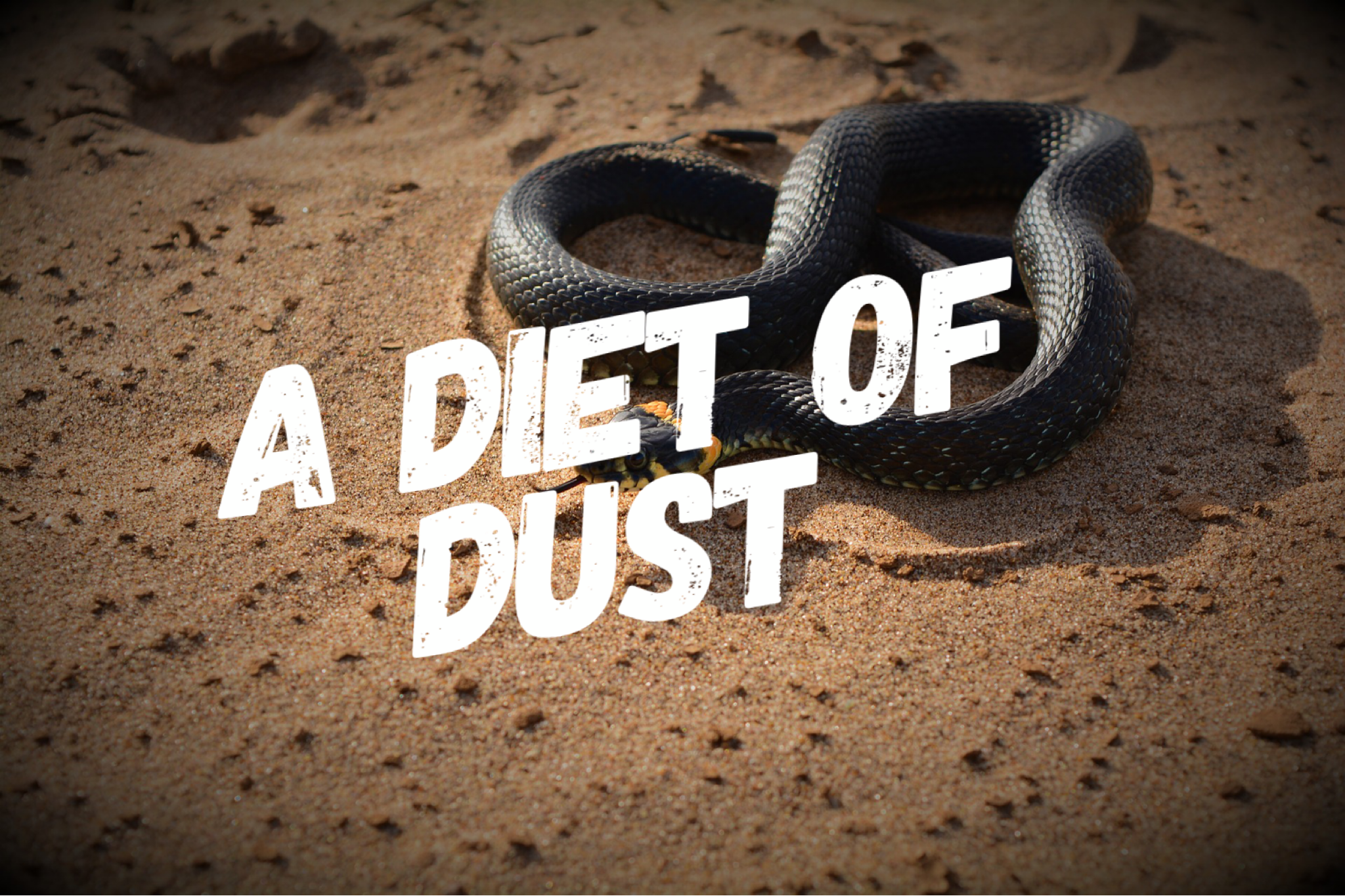A Diet of Dust
A lifetime diet of dust. When the LORD God handed down a judicial sentence to the serpent in Genesis 3, he said:
Cursed are you as none of the livestock and as none of the animals. You will crawl on your belly and you will eat dust all the days of your life. Genesis 3:14
Eat dust. The changing relationship between God and humanity in Genesis 1-2 has been monitored by means of their diet from the very beginning. This theme of diet continues with the serpent. For its role in the downfall of the human race, the LORD pronounced a curse on it. Moses used a pun to draw out the irony: Once the serpent was prudent (Hebrew term: arum) as no other animal in the garden, now it was arur,[1] cursed as no other animal in the garden. From prudent like no other, to cursed like no other.
The curse appears to involve two elements: crawling on its belly and eating dust for its entire lifetime. Does this suggest that once upon a time, the serpent had legs and feet and walked upright like humans or on four legs as other creatures? Does it suggest that a form of evolution took place after the fall? Not at all.
The point that the author is making is that by crawling on its belly, the serpent will eat a diet of dust. Doomed to eat a diet of dust is the emphasis. The diet of dust is the curse placed on it by the LORD God.
Meaning what, exactly? Many defend this curse by noting that snakes use their tongues to gather information about its prey and in the process of withdrawing its tongue back into its mouth, it ingests dust. Others note that the snake’s prey, when eaten and swallowed, inevitably brings dust into the snake’s digestive system.
But the same thing happens to many animals when they eat food or other prey. Both grass eaters (such as cows, deer, horses, sheep, goats), meat eaters (all manner of canines and felines), and seed eaters (such as birds) inadvertently eat dust as part of their diet. In the same way that dust is not the main portion of their diet, neither is dust the main portion of the snake’s diet. In the physical world, they eat dust inadvertently. So, does eating dust inadvertently constitute the curse on the serpent for what it did?
What did Moses mean when he recorded the curse on the serpent in Genesis 3:14? What does a diet of dust mean if it constitutes the main penalty for denying what God had said and, thereby, luring the human race into sin against the LORD God? What is so bad about a eating diet of dust? How does it rise to the serious level of a curse?
Here is where a knowledge of how to use a concordance can assist the Bible student. Else where in the Hebrew Bible, eating dust is an expression meaning a sign of total defeat. Observe how eating dust is used in the following reference:
A wolf and a lamb will graze together, a lion, lie an ox, will eat straw, and a snake’s food will be dust. Isaiah 65:25
The prophet describes a time when the creation will be restored to God’s original design in the Garden.[2] Animals that today kill each other, will live at peace with each other as they once did. Their diet will revert to what it once used to be. Lions will no longer be carnivorous, eating lambs, but straw.
Yet, even in this period of peace and victory, snakes will still eat dust. Their diet will never change, even in the new creation. In other words, the curse on serpents will not be lifted and they will suffer total and endless defeat.[3]
Incidentally, this is why Jesus told his apostles to shake off the dust from their feet when people rejected their message of the Kingdom of God.[4] Paul and Barnabas shook the dust from their feet when the citizens of Pisidian Antioch rejected the message of Jesus.[5]
So, a diet of dust is an expression used to describe total defeat. God’s redemptive program—centered in Jesus Christ--will restore animals to their original design and humanity to his divine presence. But the serpent and its seed will never be restored. They will be losers for all eternity, defeated forever, doomed to eat dust.
Pass the pork chops, please and thank you. But hold the dust.
Thank you for reading.
[1] The writers of the Hebrew frequently use puns to make their point or to show irony. In this case, the term arum (“prudent”) and the term arur (“cursed”) sound very similar when pronounced. Listening to this story in the Hebrew language would no doubt bring recognition to the listeners.
[2] See similar language in Isaiah 11:1-9.
[3] The association with dust as total defeat is also seen in Isaiah 49:23 and Deuteronomy 28:24.
[4] Luke 9:4.
[5] Acts 13:13:51.
